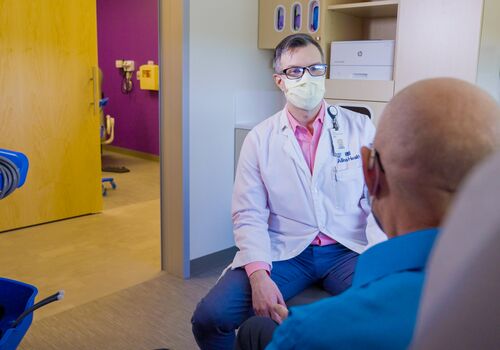
Precision Medicine Cancer Treatment Using Targeted Drug Therapies
At Allina Health Cancer Institute (AHCI), we identify the precise genetic makeup of cancer genes for individual patients. We then evaluate which therapies will best target and attack that specific cancer, a process known as precision medicine cancer treatment.
Options for precision medicine cancer treatments are rapidly expanding. When we consider various treatment options, we tailor our recommendations for each patient and integrate this approach throughout our cancer care services.
AHCI weighs treatment options from a personalized care perspective

We know that cancers, even at an early stage, usually have several treatment options. As AHCI’s physicians make early cancer diagnoses and classify tumors, we consider all available treatments. These options include drug therapies to target specific cancer cells and immunotherapies to stimulate the patient’s immune system.
Our oncologists have used some of these customized treatments for decades. For example, we apply targeted therapy against a genetic mutation known as BCR-ABL for patients with chronic myeloid leukemia.
For our breast cancer patients, the process is similar. After a biopsy shows whether a patient’s receptors for estrogen, progesterone and HER2 are positive or negative, and whether there are any mutations, we may recommend targeted therapy with:
- Chemotherapy medications
- Chemotherapy plus immunotherapy
- Endocrine therapy
- Anti HER2 therapy
- A combination of the above therapies
As part of our personalized care approach, we also consider individual preferences in our recommendations, including the patient’s:
- Preferred place for cancer care
- Goals for their care
- Family situation and support systems
AHCI follows patients over time
AHCI’s application of precision medicine not only happens at the time of diagnosis, but over the course of the patient's treatment.
At the initial diagnosis, a cancer’s genomic profile may indicate a particular targeted therapy. However, as cancer cells mutate, they may render a specific therapy ineffective over time. This phenomenon is common with epidermal growth factor receptor (EGFR) mutations in lung cancer.
When tumor mutations create resistance to a targeted therapy, we will either rebiopsy the solid tumor, obtain a liquid biopsy, or both, to look for the mutation in the patient’s blood. Depending on the mechanism of the drug resistance, we may have new therapies that will work better.
Sometimes, new tests and approved drugs become available during a patient’s treatment, and these new options prove beneficial.
To illustrate this process with a real case, an AHCI patient had non-small cell lung cancer. It appeared that she had exhausted all of her treatment options. However, we discovered that the cancer had a specific mutation known as KRAS p.G12C. That mutation has an FDA-approved drug treatment called sotarasib. We started her on this drug one year ago, and the disease continues to show a response. The patient has started to gain weight and is now taking just 50 percent of the original dose.
AHCI’s precision medicine tumor board keeps current with new advancements
The rapid evolution occurring in precision medicine cancer treatments requires continuous knowledge updates. To ensure that we offer patients the best, most current treatment options, we rely on an array of specialists.
AHCI’s precision medicine tumor board combines the expertise from pathologists, medical oncologists, genetic counselors, and outside consultants. At tumor board meetings, these specialists perform in-depth data reviews and communicate any nuances that affect patient treatment.
Precision medicine clinical trials at AHCI
Researchers are also developing clinical trials based on precision medicine. These trial designs depend upon the genomics of the tumor and whether a patient has a particular genomic alteration. In addition to our established research, AHCI expects to participate in expanded precision oncology trials in the near future.
How to refer a patient to AHCI
We welcome the opportunity to work with referring physicians.
Providers within Allina Health can send a referral request through Epic, our electronic medical records system.
Providers from outside Allina Health can refer patients by calling our nearest cancer center:
- AHCI Buffalo: 763-684-7747
- AHCI Cambridge: 763-688-8700
- AHCI Coon Rapids: 763-236-0808
- AHCI Faribault: 507-497-3721
- AHCI Hastings: 651-404-1515
- AHCI Minneapolis: 612-863-0200
- AHCI New Ulm: 507-217-5562
- AHCI River Falls: 715-307-6430
- AHCI St. Paul: 651-241-5111